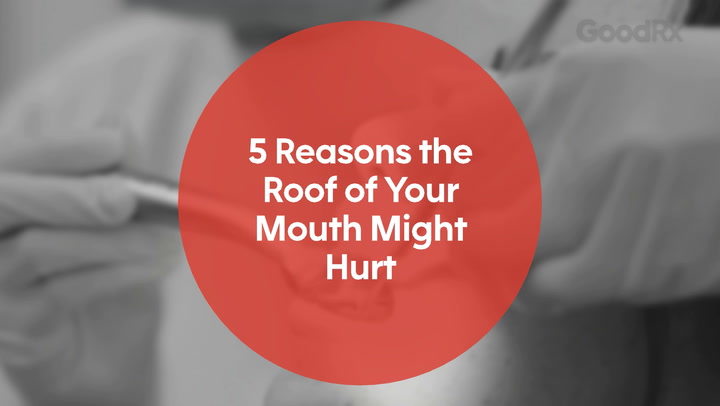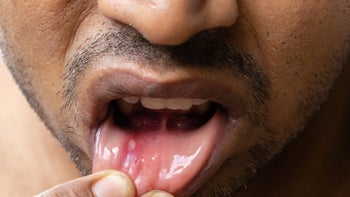
What Causes Canker Sores? 5 Common Causes and What They Say About Your Health
Key takeaways:
Canker sores are small, painful ulcers that you can get in your mouth.
The exact cause of canker sores is not known. But they can be triggered by stress, acidic foods, injury in the mouth, and other factors.
Canker sores usually go away on their own. But you should see a healthcare provider if they don’t go away or you develop a rash, fever, or other signs of illness.
Table of contents

You’ve probably had a painful sore in your mouth at one time or another. Almost everyone gets a canker sore at least once in their lifetime. If you get them repeatedly, you may have wondered what causes them. While they are usually nothing to worry about, canker sores can sometimes be a clue of underlying medical conditions. Let’s take a closer look at what causes canker sores and what they can say about your health.
What are canker sores?
Canker sores (aphthous ulcers) are painful ulcers that can form inside the mouth. But they are not always easy to see. You might first notice a canker sore while eating or drinking. This can irritate the sore and make it hurt. It’s common to have them form on the following areas:
Gums
Cheeks
Tongue
Lips
Save over 40% on Qsymia with GoodRx
Discover the once daily Qsymia for weight management. Qsymia is for adults and children 12-17 in combination with a healthy diet and regular exercise.

If you’re able to see the canker sore in your mouth, it may look like a small circle of pale skin with a red ring around it. It could have a yellow or white coating on top. Canker sores are usually single sores. But they can also sometimes occur in groups too.
What causes canker sores?
The exact cause of canker sores is not fully understood, but there are some theories that it may be due to an improper immune system response. This is believed to be the case because canker sores are common in people with autoimmune conditions and weakened immune systems.
Although there is no clear cause of canker sores, there are common triggers. Let’s take a closer look at five common things that can cause a canker sore to form.
1. Acidic foods
Acidic foods and drinks can irritate the tissue in your mouth (oral mucosa) and cause canker sores to form. These can include foods and drinks like:
Tomatoes
Vinegar
Lemons
Juices
Sodas
Once you have a canker sore, these foods and drinks should be avoided because they can cause the sore to be more painful and take longer to heal.
2. Mouth injury
Sharp foods, forks, and your teeth all pose the potential to cause injuries in your mouth. When there is trauma in the mouth, this can trigger a mouth ulcer to form. These injuries can become canker sores if they’re irritated by food, drink, or bacteria.
3. Stress
It’s not fully understood why stress can cause canker sores. But it may be due to the negative effect stress has on your immune system. If you develop canker sores when going through periods of stress, try stress-reducing activities like:
4. Hormonal changes
Some women find that they’re more likely to get canker sores at certain times of their menstrual cycle. It’s not entirely clear why, but hormonal changes in pregnancy or during the menstrual cycle can cause changes in the oral mucosa.
5. Viral infections
Some people may get canker sores when they’re sick with a viral illness. Although the virus may be contagious, the canker sore isn’t. It’s not clear why this happens in some people but not others. It could be that some people are more likely to get canker sores when under the stress of illness.
What medical conditions cause canker sores?
Anyone can get canker sores. But they’re also more common in people with certain medical conditions. Canker sores can sometimes be a sign of something more serious like the following health conditions.
Lupus
Lupus (systemic lupus erythematosus) is an autoimmune condition that affects many areas of the body. In lupus, the body’s own immune system begins to attack healthy tissues. When having an active lupus flare-up, it’s possible to have mouth sores.
Lupus can also cause many other symptoms, including:
Fever
Fatigue
Joint pain
Rashes
Behcet’s disease
Behcet’s disease is an autoimmune condition that affects your blood vessels. It may show up as ulcers in the mouth and on the genitals. It also causes inflammation in the eyes (chronic relapsing uveitis). The cause of Behcet’s disease is uncertain, but it’s most common in young adults.
Celiac disease
Celiac disease is a condition where your immune system sees gluten, a protein in wheat and other grains, as a threat. The immune system reacts to this threat, causing injury to your digestive tract. When exposed to gluten, people with celiac disease may have mouth ulcers and other symptoms like:
Chronic diarrhea
Weight loss
Anemia
Rashes
With celiac disease, the mouth ulcers tend to heal when gluten is removed from the diet.
Inflammatory bowel disease (IBD) and ulcerative colitis
Inflammatory bowel disease (IBD) is a group of chronic autoimmune conditions affecting the digestive system. IBD commonly refers to conditions like Crohn’s disease and ulcerative colitis — which are marked by inflammation in the gastrointestinal tract (gut).
IBD can cause mouth ulcers and other symptoms including:
Nausea or vomiting
Bloody stool
Abdominal pain
Rashes
Weight loss
HIV/AIDS
Canker sores are common in people with acquired immunodeficiency syndrome (AIDS) and human immunodeficiency virus (HIV), the virus that causes AIDS. These conditions affect the immune system and may be why it’s common for canker sores to form.
Along with mouth ulcers, people with HIV or AIDS may have symptoms like:
Fatigue
Fever/chills
Swollen lymph nodes
Night sweats
Muscle aches
Rashes
Can vitamin deficiencies cause canker sores?
Low levels of some vitamins and minerals have been linked to canker sores. This is likely because certain vitamins and minerals are needed for normal tissue healing and immunity. Most people are able to get essential vitamins and minerals from their diet. But you can become deficient if you aren’t eating enough nutrient-rich food, or if you have conditions or take medications that block these nutrients from being absorbed.
Here are some vitamins and minerals that may make it more likely for you to get canker sores if you are deficient in them.
Folic acid
Some people with frequent canker sores have been found to have lower levels of folate in their blood. Folic acid or folate is a B vitamin found in fruits, vegetables, and meat products. The link between canker sores and low folate levels is likely because folate plays an important role in helping your cells grow and repair themselves.
Common foods that are high in folate include:
Asparagus
Leafy greens
Avocado
Beef liver
Oranges
Zinc
Zinc is a trace mineral found primarily in meat and seafood. It helps strengthen your immune system and heal wounds. Because of the important role zinc plays in keeping you healthy, a zinc deficiency can cause slow wound healing and canker sores.
Foods to boost zinc in your diet include:
Oysters
Turkey
Yogurt
Beans
Nuts
Iron
Iron deficiency has been linked to canker sores. Iron is an essential mineral that your body uses to make red blood cells. Not eating enough iron can cause iron-deficiency anemia, which can make you feel tired and weak. And you may also develop canker sores if you have iron deficiency.
Iron is found in red meat and in plant foods, such as:
Beef
Chicken
Sardines
Tofu
Lentils
Spinach
Vitamin B12
Canker sores can be one sign of B12 deficiency. B12 is a B vitamin that’s only found naturally in animal-based foods, like beef, poultry, and dairy. Vegetarians and vegans can be prone to B12 deficiency if they don’t take a B12 supplement or eat foods that have B12 added, like fortified grains. In addition to canker sores, B12 deficiency may also cause symptoms like:
Fatigue
Numbness in your fingers and toes
Palpitations
Depression
Calcium
It’s not exactly clear why, but calcium deficiency has been shown to cause or worsen canker sores. Calcium is a mineral found in dairy products and leafy green vegetables. Good sources of calcium-rich foods include:
Dairy products like milk or cheese
Yogurt
Tofu
Fortified orange juice
Leafy greens like kale or spinach
Salmon
Sardines
Calcium deficiency is common in adults. So, it’s important to make sure your diet has enough calcium for your body’s needs.
Why do I keep getting canker sores?
Some people are just more prone to getting canker sores, and it’s not entirely clear why. And for most of these people, there is no serious underlying cause. But if you repeatedly get canker sores, your healthcare provider needs to determine whether you have recurrent aphthous stomatitis (RAS). RAS is the most common condition that causes repeated ulcers in the mouth.
The exact reason some people get RAS isn’t known. Certain factors make RAS more likely to happen, including:
Immune system disorders
Genetics or family history
Allergies
Nutritional status
Certain medications (like beta blockers, NSAIDs, or immunosuppressants)
The goal of treatment for RAS is to reduce severity and frequency of outbreaks and to promote healing of ulcers.
When should I see a doctor about canker sores?
Getting a canker sore every now and then is usually not a sign of a serious issue. Canker sores tend to heal on their own in a week or so without any medical treatment. But sometimes they can be a signal that there’s something else going on. Warning signs that you should see your healthcare provider include:
Fever
Blisters on the skin
Eye redness
Any kind of sore if you have a weakened immune system
Trouble eating or drinking
Feeling generally ill
Sores lasting more than 10 days without improving
The bottom line
Canker sores are small, painful sores in your mouth that usually go away on their own in about a week or 2. The exact cause of canker sores isn’t known. But they can be triggered by acidic foods, small injuries in the mouth, stress, and other factors.
Canker sores are not usually a cause for concern. But they can sometimes be a sign of a more serious issue like a vitamin deficiency or chronic illness. If you have frequent canker sores, talk to your primary care provider about possible causes and what you can do about them.
Why trust our experts?


References
AAOM Web Writing Group. (2007). Canker sores. The American Academy of Oral Medicine.
Adil, A., et al. (2023). Behcet disease. StatPearls.
Akintoye, S. O., et al. (2015). Recurrent aphthous stomatitis. Dental Clinics of North America.
Campisi, G., et al. (2008). Coeliac disease: Oral ulcer prevalence, assessment of risk and association with gluten-free diet in children. Digestive and Liver Disease.
Familydoctor.org. (2023). Canker sores. American Academy of Family Physicians.
Kozlak, S. T., et al. (2012). Reduced dietary intake of vitamin B12 and folate in patients with recurrent aphthous stomatitis. Journal of Oral Pathology and Medicine.








